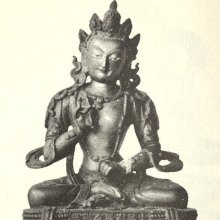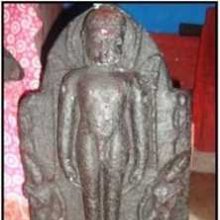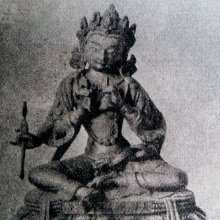Shakra, Śakra, Sakra, Śākra: 35 definitions
Introduction:
Shakra means something in Buddhism, Pali, Hinduism, Sanskrit, Jainism, Prakrit, the history of ancient India, Marathi, Hindi. If you want to know the exact meaning, history, etymology or English translation of this term then check out the descriptions on this page. Add your comment or reference to a book if you want to contribute to this summary article.
Shakra has 34 English definitions available.
The Sanskrit terms Śakra and Śākra can be transliterated into English as Sakra or Shakra, using the IAST transliteration scheme (?).
Images (photo gallery)
Languages of India and abroad
Sanskrit dictionary
[Deutsch Wörterbuch]
Source: Cologne Digital Sanskrit Dictionaries: Böhtlingk and Roth Grosses Petersburger WörterbuchŚakra (शक्र):—(von 1. śak) [Uṇādisūtra 2, 13.]
1) adj. vermögend, stehendes Beiwort des Indra: viśvāni śa.ro naryāṇi vi.vān [Ṛgveda 4, 16, 6. 5, 34, 3. 4.] hvayāmi śa.raṃ puruhū.amindram [6, 47, 11. 7, 20, 9. 104, 20. fg. 8, 2, 23.] sa naḥ śa.raści.ā śakat [32, 12.] [Atharvavedasaṃhitā 8, 1, 8. 12, 1, 37.] [LĀṬY. 1, 4, 5.] Götter überh. [Atharvavedasaṃhitā 3, 21, 4. 11, 6, 12. 18.] [Taittirīyabrāhmaṇa 2, 4, 3, 4.] die Marut [Ṛgveda 1, 166, 1.] die Aśvin [2, 39, 3. 10, 24, 4.] Pūṣan [8, 4, 15. -] [Atharvavedasaṃhitā 5, 1, 7. 28, 8.] Auch die Anknüpfung an 2. śak mittheilsam, hilfreich ist für die alte Sprache zulässig. —
2) m. a) ein Name Indra's [Amarakoṣa 1, 1, 1, 37.] [Trikāṇḍaśeṣa 3, 3, 376.] [Hemacandra’s Abhidhānacintāmaṇi 172.] [Anekārthasaṃgraha 2, 460.] [Medinīkoṣa r. 88.] [Halāyudha 1, 54. 5, 40.] [NĀRĀYAṆOP.] in [Weber’s Indische Studien 1, 381.] [Mahābhārata 3, 1724. 2123. 3043. 13, 330.] [Mahābhārata 3, 1724. 2123. 3043. 13, 330.] [Harivaṃśa 3789. fgg.] [Mahābhārata 3, 1724. 2123. 3043. 13, 330.] [Rāmāyaṇa 1, 1, 6. 6, 3. 26. 2, 91, 13. 3, 49, 41] (v. l. śukra und so auch ed. Bomb.). [?54,8. Raghuvaṃśa.1,75.3,39. Varāhamihira’s Bṛhajjātaka S. 32,6. 33,20. 43,6. Rājataraṅgiṇī.4,224. Viṣṇupurāṇa 78. Brahmapurāṇa in Lassen’s Anthologie (III) 50,3. 53,20. Oxforder Handschriften 27,a,17. 44,b,25. fg. 103], a, 29. Herr des Nakṣatra Jyeṣṭhā [WEBER, Nakṣ. 2, 374. 379.] [Varāhamihira’s Bṛhajjātaka S. 98, 5. 12.] der 7ten Tithi [99, 1.] ein Āditya [Mahābhārata 1, 2523.] [Harivaṃśa] [?175.Viṣṇupurāṇa 122. Bhāgavatapurāṇa 6, 6, 37.] — [Rgva tch’er rol pa ed. Calc. 8, 20. 9, 43 u.s.w.] [BURNOUF,] [Intr. 131.] ein Jātaka Buddha's [VYĀḌI] beim Schol. zu [Hemacandra’s Abhidhānacintāmaṇi 233.] — b) Wrightia antidysenterica R. Br. [Amarakoṣa 2, 4, 2, 47.] [Trikāṇḍaśeṣa] [Hemacandra’s Anekārthasaṃgraha] [Medinīkoṣa] — c) Terminalia Arjuna W. und A. [Hemacandra’s Anekārthasaṃgraha] [Medinīkoṣa] — Vgl. ati, pṛthivī, bhū .
--- OR ---
Śākra (शाक्र):—(von śakra)
1) adj. (f. ī) Indra gehörig, ihn betreffend, an ihn gerichtet: astra [Mahābhārata 7, 3358.] dantin [Kathāsaritsāgara 115, 148.] strī [110, 82.] māyā [Oxforder Handschriften 59,b,26.] yuga [Varāhamihira’s Bṛhajjātaka S. 8, 33.] mantra [43, 30.] —
2) f. ī Indra's Gattin; übertragen auf die Durgā (neben indrāṇī und indrajananī) [Devīpurāṇa im Śabdakalpadruma] —
3) n. das unter Indra stehende Nakṣatra Jyeṣṭhā [Varāhamihira’s Bṛhajjātaka S. 6, 11. 7, 10.]
Sanskrit, also spelled संस्कृतम् (saṃskṛtam), is an ancient language of India commonly seen as the grandmother of the Indo-European language family (even English!). Closely allied with Prakrit and Pali, Sanskrit is more exhaustive in both grammar and terms and has the most extensive collection of literature in the world, greatly surpassing its sister-languages Greek and Latin.
See also (Relevant definitions)
Starts with (+117): Shakra-yajna, Shakrabanasana, Shakrabhaksha, Shakrabhakshabhakshaka, Shakrabhakshamakha, Shakrabhakshamakhotsava, Shakrabhanga, Shakrabhanu, Shakrabhavana, Shakrabhid, Shakrabhilagna, Shakrabhilagnaratna, Shakrabhubhava, Shakrabhuruha, Shakrabhuvana, Shakrabija, Shakracapa, Shakracapagunadarshana, Shakracapasamudbhava, Shakracapay.
Ends with: Atishakra, Bhushakra, Prithivishakra, Shatadrikshakra.
Full-text (+370): Shakragopa, Shakradhvaja, Shakravahana, Shakraja, Indra, Shakrashana, Bhushakra, Shakrashiras, Prithivishakra, Shakrasrishta, Shakradish, Sakriya, Asakra, Shakrayudha, Shakrashakhin, Shakrasarathi, Shakrabhid, Shakranandana, Shakravalli, Shakramurdhan.
Relevant text
Search found 112 books and stories containing Shakra, Śakra, Sakra, Śākra; (plurals include: Shakras, Śakras, Sakras, Śākras). You can also click to the full overview containing English textual excerpts. Below are direct links for the most relevant articles:
Rig Veda (translation and commentary) (by H. H. Wilson)
Garga Samhita (English) (by Danavir Goswami)
Verse 3.4.1 < [Chapter 4 - The Coronation-Bathing of Śrī Kṛṣṇa]
Verse 3.2.3 < [Chapter 2 - The Great Festival of Śrī Girirāja]
Verse 1.7.46 < [Chapter 7 - Description of the Conquest of All Directions]
Bhagavati-sutra (Viyaha-pannatti) (by K. C. Lalwani)
Part 11 - More on the movement of Indras < [Chapter 2]
Chapter 7: Lokapāla Somadeva < [Book 3]
Part 6 - Sakrendra, king of the Devas in Saudharma-kalpa < [Chapter 1]
The Skanda Purana (by G. V. Tagare)
Chapter 273 - Reckoning of Yugas < [Section 1 - Tīrtha-māhātmya]
Chapter 83 - Bilveśvara (bilva-īśvara-liṅga) < [Section 2 - Caturaśīti-liṅga-māhātmya]
Chapter 79 - Greatness of Vālakhilyāśrama (Vālakhilya-āśrama) < [Section 1 - Tīrtha-māhātmya]
Harivamsha Purana (by Manmatha Nath Dutt)
Chapter 33 - Various Kings are Appointed by Brahma < [Book 3 - Bhavishya Parva]
Chapter 95 - Pradyumna Appears Before Prabhavati and Marries Her < [Book 2 - Vishnu Parva]
Chapter 98 - The Destruction of Vajranabha < [Book 2 - Vishnu Parva]
Charaka Samhita (English translation) (by Shree Gulabkunverba Ayurvedic Society)
Chapter 5 - The Pharmaceutics of Kurchi (vatsaka-kalpa) < [Kalpasthana (Kalpa Sthana) — Section on Pharmaceutics]
Chapter 1 - The Quest for Longevity (dirgha-jivita) < [Sutrasthana (Sutra Sthana) — General Principles]
Related products






